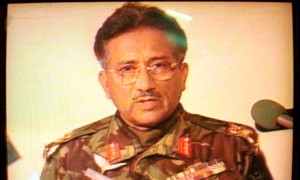 The former military dictator Pervez Musharraf should be tried for high treason, Pakistan’s prime minister said, raising the prospect of a serious clash between the country’s civilian and military masters.
The former military dictator Pervez Musharraf should be tried for high treason, Pakistan’s prime minister said, raising the prospect of a serious clash between the country’s civilian and military masters.
A treason trial would mark the first time in Pakistan’s history that a military ruler has been held accountable, and the decision was cheered by many who believe the country’s overweening army needs to accept the primacy of elected politicians.
The announcement by Nawaz Sharif, Pakistan’s recently elected prime minister, ended months of speculation over whether the government would dare take on a former president and army chief who could face the death penalty if found guilty of overturning the country’s constitution.
Only the government is able to try someone for treason, for which a special court would have to be established.
Although Musharraf is currently under house arrest and has negligible support in the country, many observers have long claimed the still powerful military elite would never allow a civilian court to try one of its former chiefs.
“Musharraf is still more popular in the army than [his successor General Ashfaq Parvez] Kayani,” said a lawyer, Chaudry Faisal Fareed.
He said Sharif risked “opening a Pandora’s Box” if the trial expanded to drag in other high-ranking officers.
Musharraf’s actions amounted to high treason, Sharif told parliament on Monday , promising that the former dictator had to “answer for all his deeds in court”.
“The prime minister is under oath to protect, preserve and defend the constitution and it is implicit in his oath that his government ensures that persons guilty of acts under Article 6 are brought to justice,” he said.
Pakistan’s attorney general said the government would bring treason charges against Musharraf for imposing emergency rule in 2007.
In a statement, Musharraf’s spokesman said the Sharif government was “demonstrating recklessness in its intention to pursue unwarranted treason charges”.
The statement said: “The people of Pakistan will not tolerate this circus, which is primarily meant to create a diversion. It is taking focus away from addressing serious challenges faced by the nation and can result in unnecessary tension amongst the various pillars of state and possibly destabilise the country.”
The development adds to the legal troubles Musharraf has attracted since his ill-judged decision to return from self-imposed exile in March in the hope of running for election.
Apparently deluded about his popularity in Pakistan, which he said he judged from his number of Facebook friends, he did not receive the mass welcome he had hoped for.
Election officials snuffed out any hope that he might make a political comeback when he was banned from standing in last May’s election.
Private prosecutions were brought against him for his alleged role in the assassination of the former prime minister Benazir Bhutto in 2007, the killing of a prominent tribal separatist leader in 2006 and the detention of senior judges in 2007 during the tail end of his presidency.
In the view of many lawyers, Musharraf is likely to be successful in defending himself against those charges, but treason charges are “an open and shut case”, according to Fareed.
Talat Masood, a retired army officer, said a trial was inevitable given that Musharraf had alienated two of the country’s most powerful men: Sharif, whom he toppled in a 1999 coup, and Iftikhar Muhammad Chaudhry, the activist chief justice who was the object of the then president’s battle against senior judges in 2007.
“It’s a gamble, no doubt about it,” said Masood. “Sharif is taking a certain element of risk because the fight against militancy is the greatest challenge Pakistan faces right now and he needs the military for that.”
Some have already detected army meddling in the issue, including Musharraf supporters’ attack on lawyers outside a court hearing in April.
In May, a senior lawyer involved in the investigations into Bhutto’s murder was shot dead as he drove to work in Islamabad.
Many assume that even if the trial does go ahead, a political deal will be hatched to spare Musharraf’s life, or even allow him to leave the country to live out his days in exile.
One possible scenario might see the intervention of Saudi Arabia, one of Pakistan’s closest allies. Such an outcome would be rich in irony given that Sharif was given exile in the kingdom after he Musharraf deposed him.
Akhtar Hussain, a former vice-president of Pakistan’s bar association, said it was likely Musharraf would ultimately receive a presidential pardon after a long legal process that is likely to stretch into 2014 and beyond.
Merely putting the former general on trial would mark an important milestone for Pakistan, he said. “The key thing is the initiation of the trial itself, which is very important for the standing of democratic institutions in this country. The result, whether acquitted or ultimately pardoned is a different matter.”
The Guardian

Leave a Reply
You must be logged in to post a comment.